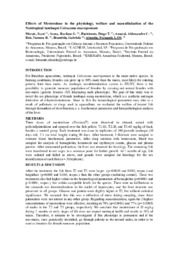Effects of Mesterolone in the physiology, welfare and masculinization of the neotropical tambaqui Colossoma macropomum.
Effects of Mesterolone in the physiology, welfare and masculinization of the neotropical tambaqui Colossoma macropomum.
Author(s): MORAIS, I. da S. de; SOUSA, R. G.; HASHIMOTO, D. T.; AMARAL, A. C.; REIS, V. R.; BRAMBILA, G.; O'SULLIVAN, F. L. A.
Summary: For Brazilian aquaculture, tambaqui Colossoma macropomum is the main native species. In farming conditions, females can grow up to 50% more than the males, most likely for entering puberty later than males. As tambaqui sex-determination system is XX/XY, there is the possibility to generate monosex population of females by crossing out normal females with neo-males (genetic females -XX displaying male phenotype). The goal of this study was to invert the sex phenotype of female tambaqui using mesterolone, which is a synthetic androgen derivative of dihydrotestosterone. Since in fish the hematological parameters may alter as a result of pollutants or drugs used in aquaculture, we evaluated the welfare of treated fish through biomarkers of liver function, i. e. biochemical parameters and histopathological analysis of the liver.
Publication year: 2022
Types of publication: Abstract in annals or event proceedings
Unit: Embrapa Western Amazon
Keywords: Colossoma Macropomum, Tambaqui
Observation
Some of Embrapa's publications are published as ePub files. To read them, use or download one of the following free software options to your computer or mobile device. Android: Google Play Books; IOS: iBooks; Windows and Linux: Calibre.
Access other publications
Access the Agricultural Research Database (BDPA) to consult Embrapa's full library collection and records.
Visit Embrapa Bookstore to purchase books and other publications sold by Embrapa.

